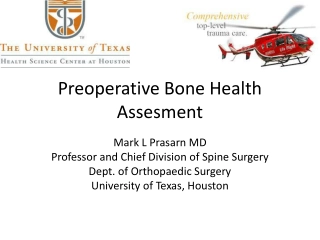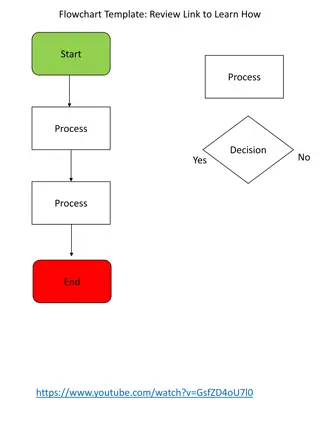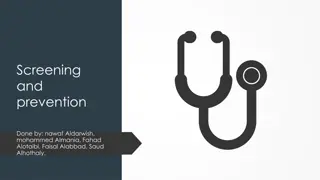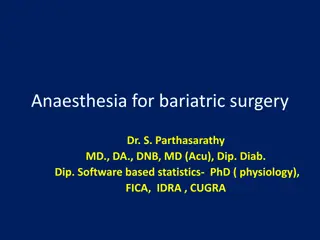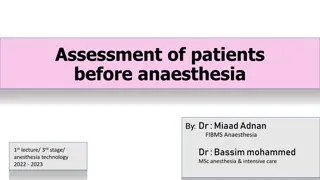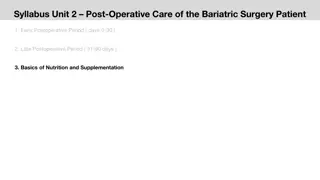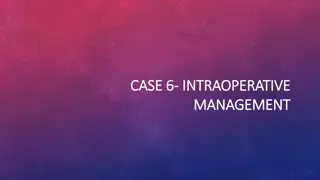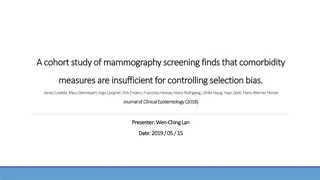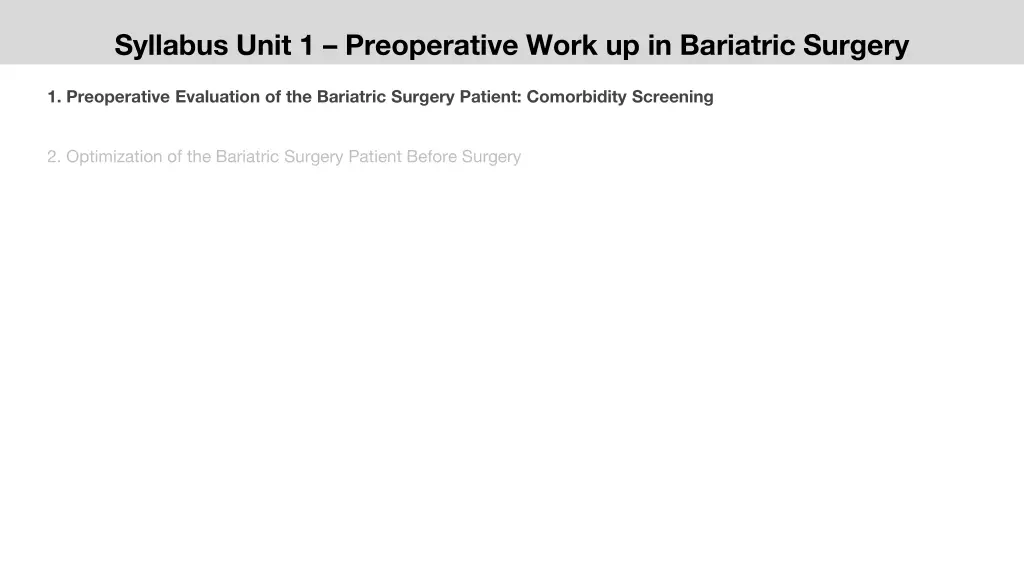
Preoperative Work-up in Bariatric Surgery: Evaluation and Optimization
Comprehensive preoperative evaluation in bariatric surgery involves multidisciplinary team assessment, psychological evaluation, nutritional planning, and medical clearance to ensure positive outcomes. Candidates are selected based on BMI, comorbidity evaluation, and prior weight loss attempts. Psychological assessment is crucial for identifying support needs, including addressing alcohol dependence and smoking cessation. Nutritional evaluation by a dietitian ensures adherence to dietary guidelines and detects pre-existing deficiencies. A thorough medical evaluation is essential before clearance for surgery.
Download Presentation

Please find below an Image/Link to download the presentation.
The content on the website is provided AS IS for your information and personal use only. It may not be sold, licensed, or shared on other websites without obtaining consent from the author. If you encounter any issues during the download, it is possible that the publisher has removed the file from their server.
You are allowed to download the files provided on this website for personal or commercial use, subject to the condition that they are used lawfully. All files are the property of their respective owners.
The content on the website is provided AS IS for your information and personal use only. It may not be sold, licensed, or shared on other websites without obtaining consent from the author.
E N D
Presentation Transcript
Syllabus Unit 1 Preoperative Work up in Bariatric Surgery 1. Preoperative Evaluation of the Bariatric Surgery Patient: Comorbidity Screening 2. Optimization of the Bariatric Surgery Patient Before Surgery
Preoperative Preparation for Bariatric Surgery The preoperative evaluation must be comprehensive and conducted by a multidisciplinary team. This multidisciplinary approach should be available to all patients. To ensure a positive outcome after a bariatric surgery, several steps during the preoperative evaluation must take place. This team could include: endocrinologists, dietitian, psychologists, anesthesiologists, nurses, and surgeons. Candidate selection criteria include body mass index, evaluation of comorbidities with respect to the patient s overall health, and a history of prior weight loss attempts.
Psychological Evaluation Psychological evaluation of patients is important before bariatric surgery. It is important to determine areas in which the patient may need further support so that they achieve the best postoperative outcomes. The assessment should include psychiatric history, screening for eating disorders and history of substance use. Prior weight loss attempts and adherence with therapy should also be discussed. Preoperative education is pivotal in managing expectations and dispelling any misconceptions that patients may have. Alcohol-dependent patients must start rehabilitation and detoxification before the procedure. One-year abstinence prior to surgery must be achieved. Smoking cessation has proven postoperative complications. Heinberg LJ, Ashton K, Coughlin J: Alcohol and bariatric surgery: review and suggested recommendations for assessment and management. Surg Obes Relat Dis 8 (3):357-363, 2012. doi: 10.1016/j.soard.2012.01.016. Although current alcohol abuse/dependence is less than that in population- base rates, bariatric surgery candidates have a greater history of alcohol use disorders. Physiologic changes after surgery can also change vulnerability to problematic alcohol use, and many patients continue to consume alcohol after surgery. improved outcomes and reduced
Nutritional Evaluation and Weight Loss Plan The nutrition and dietetic assessment by a dietitian, experienced in bariatric surgery, is essential. Bariatric surgery impacts on dietary intake and nutritional absorption and requires adherence to dietary guidelines, nutritional supplements nutritional screening will detect any pre-existing nutritional deficiencies which can be corrected prior to surgery. and monitoring. Preoperative Patients need access to education programs so that they are well informed and prepared prior to surgery, regarding the dietary and nutritional guidelines, changes in eating behaviors and the need to be more physically active.
Medical Clearance A complete evaluation is necessary before the patient is cleared to undergo bariatric surgery. A comprehensive medical evaluation entails meticulous history taking and a physical examination that includes a review of the cardiovascular, systems. Metabolic and nutritional status should be also assessed. pulmonary, and gastrointestinal A complete metabolic blood test should be performed and it is especially important to achieve optimal glycemic control to minimize the risk of postoperative complications. Obesity is directly associated with high cardiovascular risk as it is a well-known risk factor for coronary artery disease, arrhythmias, left- ventricular hypertrophy and heart failure.
Medical Clearance As for cardiovascular disease, obesity is also a risk factor for airway disease due to its mechanical restriction. Many patients present with obstructive sleep apnea and some of them may receive the diagnosis during the preoperative work-up. It is not recommended universally, but in some centers a routine spirometry is performed. VTE (venous thromboembolism) is a significant cause of postoperative morbidity. Most patients receive some kind of prophylaxis. This prophylaxis is based on lower extremity compression and standard low- molecular-weight heparin.
Preoperative Gastrointestinal Imaging Abdominal Ultrasound (US): Patients with obesity have a high incidence of cholelithiasis, so US may be performed during the preoperative workout. This is particularly important for patients undergoing Roux-en-Y gastric bypass because this procedure precludes the endoscopic exploration of the biliary tract in case of choledocholithiasis. It also helps to assess fibrosis, steatosis, and nonalcoholic steatohepatitis. UpperGI radiography: It is not routinely performed, but as these bariatric procedures involve altering normal anatomy it allows the evaluation of preexisting anatomical or physiological variations.
Preoperative Gastrointestinal Imaging Upper-GI Endoscopy: A preoperative endoscopy may be recommended depending on the surgeon's discretion as obesity is a risk factor for many GI diseases. Given the risk of developing GERD in some patients following Sleeve Gastrectomy, patients with severe esophagitis or Barrett's disease should not be given the option of having Sleeve Gastrectomy. When performing a gastric bypass, the remnant stomach will no longer be accessible to endoscopic control so gastric malignancy should be ruled out for patients at high risk.
References Sogg S et al. Obes. Surg. 2016.

